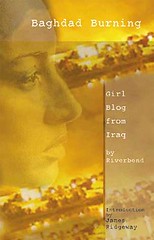 From the feminist press of the City University of New York, an announcement of a forthcoming book, and the source of my next recommendation:
From the feminist press of the City University of New York, an announcement of a forthcoming book, and the source of my next recommendation: In her riveting weblog, a remarkable young Iraqi woman gives a human face to war and occupation.While her Baghdad Burning posts may be infrequent due to continuing power outages, and photos nonexistent, Riverbend reminds us again of the human costs of war and the power of a brave writer and her weblog.
In August 2003, the world gained access to a remarkable new voice: a blog written by a 25-year-old Iraqi woman living in Baghdad, whose identity remained concealed for her own protection. Calling herself Riverbend, she offered searing eyewitness accounts of the everyday realities on the ground, punctuated by astute analysis on the politics behind these events.
Riverbend recounts stories of life in an occupied city - of neighbors whose home are raided by U.S. troops, whose relatives disappear into prisons, and whose children are kidnapped by money-hungry militias. The only Iraqi blogger writing from a woman's perspective, she also describes a once-secular city where women are now afraid to leave their homes without head covering and a male escort.
Interspersed with these vivid snapshots from daily life are Riverbend's analyses of everything from the elusive workings of the Iraqi Governing Council to the torture in Abu Gharib, from the coverage provided by American media and by Al-Jazeera to Bush's State of the Union Speech. Here again, she focuses especially on the fate of women, whose rights and freedoms have fallen victim to rising fundamentalisms in a chaotic post-war society.
With thousands of loyal readers worldwide, the Riverbend blog is recognized around the world as a crucial source of information not available through the mainstream media.
There are other blogs from Iraq, with widely varying viewpoints and agendas reflecting the various religious, ethnic, and secular points of view. For example, try A Family in Baghdad, Kurdo's World, A Star from Mosul, or Raed in the Middle. Separating the heat from the light may be difficult sometimes. War does that to people. Voices from Iraq gives a good overview of sites. Or you can just google.
There are also a number of blogs by U.S. service personnel. They vary also. Some passionately focus on their struggle to bring democracy to the Iraqi people while others question their mission or share the hell-on-earth experiences of war. Like Stuart Hughes, some "real" reporters have personal sites, Christopher Allbritton's or Kevin Sites' for example.
Because of the highly political nature of the U.S. liberation/occupation of Iraq, you may wish to shop around until you find one that you are comfortable with. Or maybe you will find yourself returning again and again to one that challenges your assumptions. That is the beauty and the power of blogs.
These eyewitnesses, who are often in harm's way, are willing to share what they are seeing with us; the least we can do is pay some attention.
No comments:
Post a Comment